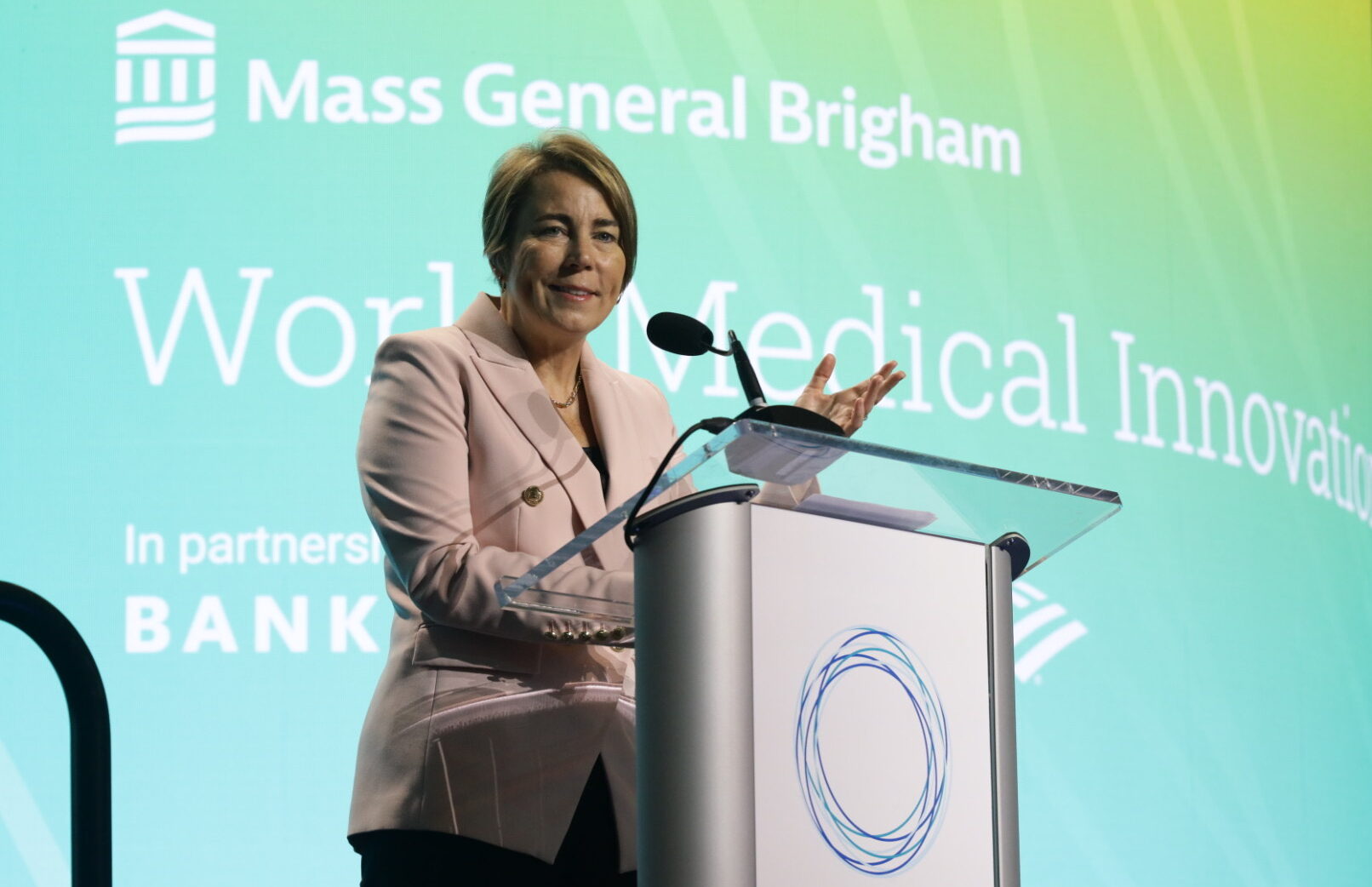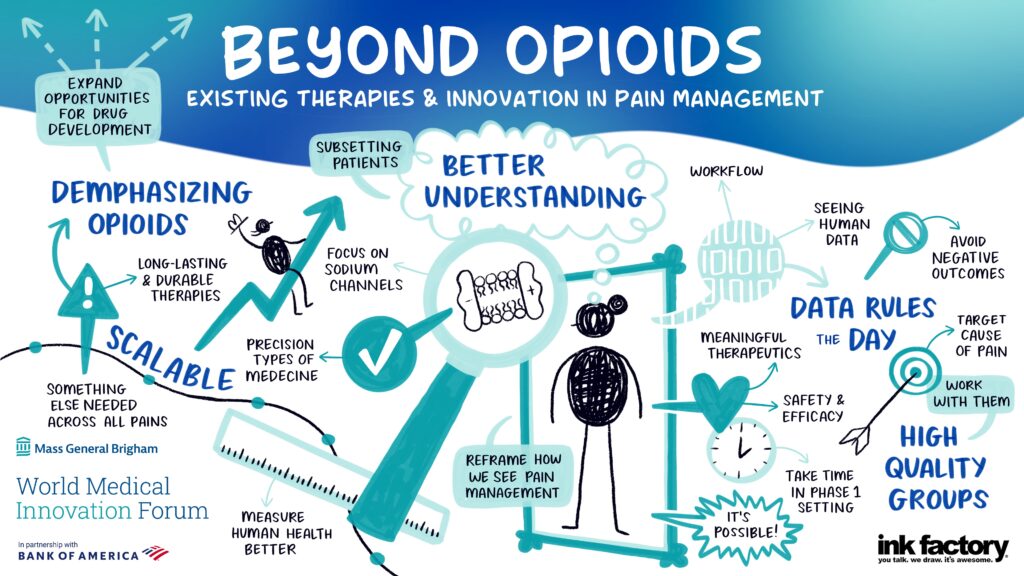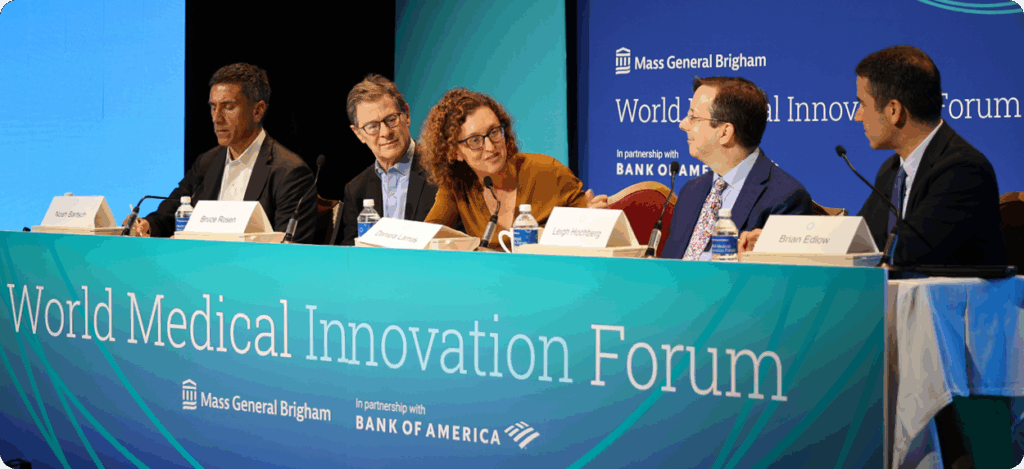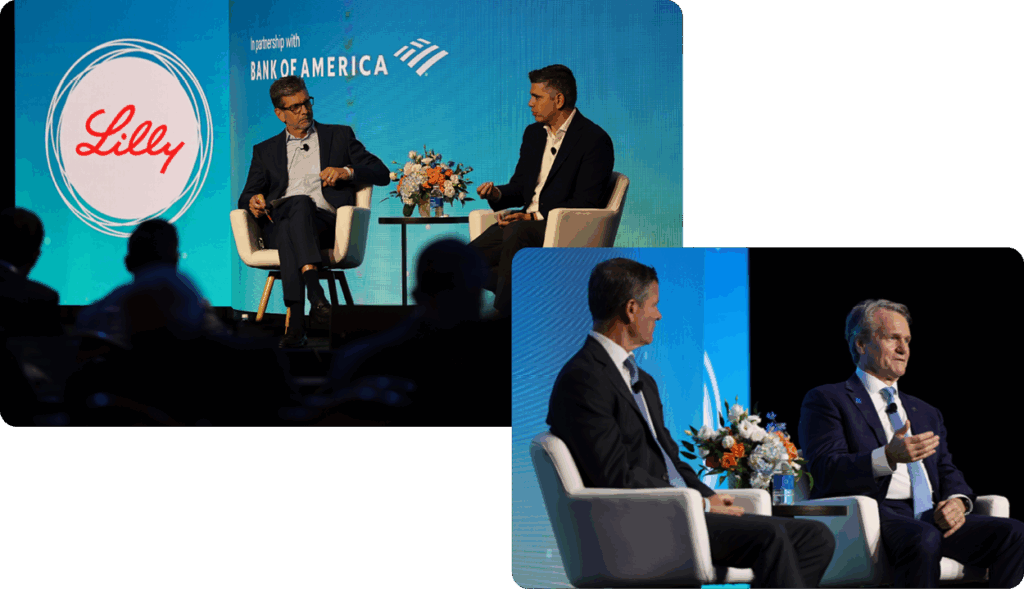WMIF MAIN SITE
2026 Event Site
She pointed to the close collaboration between state leaders, academic health systems, and industry, and stressed the importance of equity in access to new treatments. Healey also emphasized the role of public–private partnerships in strengthening the healthcare economy, creating jobs, and ensuring Massachusetts remains a worldwide hub for discovery and patient care.
AI took center stage in multiple sessions, highlighting both its potential to transform care and the challenges that come with rapid adoption. In the Cybersecurity and AI panel, David Heaney, MGB Chief Information Security Officer, led a discussion on the safeguards needed to protect patient data and trust. Panelists noted that while medicine and healthcare are prime for AI in diagnostics, patient care, and efficient operations, corresponding risks abound in cybersecurity. Panelists noted that while medicine and healthcare are prime for AI in diagnostics, patient care, and efficient operations, corresponding risks abound in cybersecurity. The panel also called for stronger transparency, clearer standards, and more leaders to help shape guidelines while regulatory frameworks—potentially a decade away—are still being defined. As Ariel Stern PhD, Professor at the Hasso Plattner Institute, cautioned, “we will get to a point very soon where not using AI is basically malpractice.”
In a separate session, James Brink MD, MGB Chief of Enterprise Radiology noted that “the future of radiology remains extremely bright, we just can’t get AI fast enough,” as he and fellow panelists from Philips, Viz.ai, and harrison.ai explored how AI is enhancing diagnostic accuracy, streamlining workflows, and reshaping imaging practices for the future of healthcare.
Watch Cybersecurity, Privacy and Resilience in AI Age | Pitfalls to Avoid and Opportunities Ahead
Watch AI and Imaging | Radiology Led Much of the AI Revolution, How is it Being Transformed?
Watch AI Diagnostics | Is the Future of Diagnostics Moving “In Silico”?

Commenting on the panel focus of finding effective alternatives for managing acute and chronic pain. Paul Negulescu PhD, Disease Area Executive for Pain at Vertex, pointed to selective sodium channel inhibitors as a long-awaited shift for patients with severe pain. Roman Camarda, Principal at Novo Holdings, cautioned that treating patients in an “umbrella” fashion rarely works, stressing the need for more tailored approaches. Panelists emphasized that therapies which are both selective and durable could shift the paradigm for pain management, offering patients longer-lasting relief without reliance on opioids.
Watch Beyond Opioids | Existing Therapies and Innovations in Pain Management
Leonardo Riella MD, PhD, Medical Director of Kidney Transplantation at MGH, led the discussion on the science behind using an animal organ in a human transplant patient with panelists Mike Curtis, eGenesis CEO, Pablo Legorreta, Royalty Pharma CEO, and Julie Sunderland, President of Oriane Consulting. 135,000 people in the US annually come into dialysis with kidney failure. Of those, only about 5,000 receive a kidney. This year, doctors at MGB performed the second xenotransplant of a genetically-edited pig kidney in a human. Panelists discussed the importance of gene editing to make the organs compatible with human patients, as well as anti-rejection medication to reduce infection risk and increase the likelihood of a successful long-term transplant.
“We are really at the cusp of delivering not just kidneys but other organs to millions of patients all over the world.”- Pablo Legorreta, CEO, Royalty Pharma
In the future, the hope is to make the organs even more human compatible without the use of immunosuppressants. The availability of xenotransplantation could ultimately make organ transplants more affordable and accessible to patients in need.
“Patients don’t view this as an option because it’s a last resort. They view this as an option around quality of life compared to dialysis.” – Julie Sunderland, President, Oriane Consulting
Watch Xenotransplantation | The Clinical Reality Emerges
This session shed light on the breakthroughs bringing gene editing from concept to clinic. Moderated by MGB’s Ben Kleinstiver PhD, and including Omar Abudayyeh PhD, Director of Gene Editing at MGB, Steve Favaloro, Genezen CEO, MIT’s David Liu PhD, Trevor Martin PhD, Mammoth Biosciences CEO, and Laura Sepp-Lorenzino PhD, Senior Advisor and former Intellia CSO, the panel pointed to life-changing cases—such as a child who received a customized therapy just seven months after diagnosis and is now thriving at home. They emphasized how advances in base and prime editing, manufacturing, and regulatory precedent are accelerating timelines and expanding the reach of these treatments.
“The science is no longer the limiting factor—it’s the process and the system. With innovation on all fronts, we can start to think about getting treatments into patients much quicker.” – David Liu PhD, MIT and Broad Institute
While challenges remain in delivery and affordability, gene editing is poised to transform care for both rare and common diseases.
Watch Gene Editing | Precision Medicine in Practice

Brian Edlow MD, Vice Chair for Research in MGB Neurology, led a session on breakthrough technologies enabling communication for patients with conditions like ALS. Studies show 25% of patients who cannot follow bedside commands—such as giving a thumbs up—can still hear and understand what is being communicated and may benefit from new tools. Collaboration between MGB and industry has been crucial for clinical progress, though challenges around access and insurance remain.
“When we’re in the ICU… and we know there’s a technology that could restore communication to a patient, we want to be able to provide it. I think we’re getting closer to achieving that.” – Leigh Hochberg MD, PhD
Watch Enabling Communications in Patients with Severe Nervous System Dysfunction
Leaders from China’s biotech ecosystem described a sector defined by efficiency, scale, and growing global ambition. Panelists Jasmine Cui PhD, InnoCare CEO, Xiayang Qiu PhD, Regor CEO, Yaping Shou MD, PhD, Wells Therapeutics CEO, and Weiyi Zhang MD, RiboX CEO, pointed to factors driving this transformation, including regulatory reforms that have sped drug approvals, lower trial costs, and a vast treatment-naïve patient population fueling faster clinical development. While challenges remain, investors are re-engaging and companies are positioning themselves to bring China-born innovation to the US and onto the global stage.
Watch Why China Biotech is Getting a DeepSeek Moment, Too
David Hyman MD, Chief Medical Officer of Eli Lilly, joined Tim Anderson MD, of BofA Securities for a wide-ranging conversation on the company’s priorities and pipeline. He discussed Lilly’s expanding role in oncology, immunology, and neuroscience, and emphasized the organizational and cultural investment required to deliver breakthrough medicines.
“The scale of investment required to deliver truly innovative medicines is enormous. And it’s not just financial—it’s organizational, it’s cultural, and it’s scientific.” – David Hyman MD
Hyman also pointed to the importance of partnerships and collaborations in sustaining innovation, noting that many of Lilly’s most promising programs began as external alliances.
Watch Fireside Chat: Focus on Eli Lilly

In a discussion moderated by Miceal Chamberlain, President of Massachusetts, Bank of America, Brian Moynihan outlined his outlook on U.S. and global markets. He noted steady but below-trend growth driven by consumer spending, while pointing to tariffs, labor constraints, and inflation as ongoing headwinds. Moynihan pointed to capital markets reopening after a slowdown, a shift he said will create new opportunities for companies to raise funds and advance innovation.
Watch Conversation on the Global Economy with Bank of America CEO Brian Moynihan
MGB CFO, Niyum Gandhi led panelists Secretary of HHS, Commonwealth of Massachusetts, Kiame Mahaniah MD, John Orsini, CFO for Northwestern Memorial Healthcare, and Laura Peabody, MGB Chief Legal Officer, on the future of care delivery and academic research. Shifts in Medicare, Medicaid, drug pricing, and cuts in federal research funding are rapidly altering the financial and operational environment for healthcare organizations. The risk of smaller community hospitals closing due to funding cuts and rising costs leaves patients in some areas in a healthcare desert. Healthcare access problems are exacerbated by issues like housing and food insecurity.
“We need to figure out is there a path forward in which the most vulnerable are protected?” – MA HHS Secretary Kiame Mahaniah MD
Panelists emphasized the importance of investing in technology in order to improve quality of care, and ways we can reframe the current state of the health and wellness sector to efficiently serve patients in times of uncertainty.
“Times of constraint can also be times of innovation.” – Niyum Gandhi, CFO, MGB
Watch Upending the US Care Delivery and Medical Research Model | Planning for Excellence After the Cuts
Day 2 closed with a captivating fireside chat featuring Peter Marks MD, PhD, Independent Consultant and former Director of the Center for Biologics Evaluation and Research at the FDA.
“The bar for vaccine approval is going to get so high, I doubt we are going to see a lot of vaccine approvals in the current climate.” – Peter Marks MD, PhD
In a candid one-on-one discussion, he noted the life-saving power of biologics, highlighting that the measles vaccine alone is estimated to save one million lives of children under five worldwide each year. Looking ahead, Marks called on the field to continue advancing drug development, support innovation wherever possible, and advocate for reforms that strengthen trust in science and accelerate the delivery of life-saving therapies.
Watch Science, Integrity, and the Future of Biologics: A Fireside Chat with Peter Marks